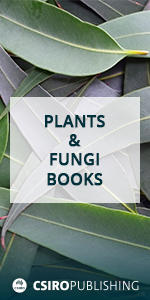
Functional Plant Biology
Volume 43 Number 11 2016
FP16135Salinity effects on chloroplast PSII performance in glycophytes and halophytes
This paper investigates effect of salinity stress and K+ nutrition on photosynthetic parameters of isolated chloroplasts and shows that chloroplasts’ ability to regulate ion transport across the envelope and thylakoid membranes play a critical role in leaf photosynthetic performance under salinity.
FP16120Potassium fluxes and reactive oxygen species production as potential indicators of salt tolerance in Cucumis sativus
Salt stress has a high impact on crop yield, with current global annual losses being around US$27 billion. Among horticulture crops, cucumber (Cucumis sativus) is considered a moderately salt-sensitive species. Here, we report a study on two cultivars of cucumber with different tolerance to salt. The ability of roots to retain K and produce reactive O species is important for salt tolerance screening and plant breeding programmes.
FP16114Proteomic responses in shoots of the facultative halophyte Aeluropus littoralis (Poaceae) under NaCl salt stress
Very little is known about the adaptation mechanism of A. littoralis under saline conditions. In this study, we investigated salt tolerance mechanisms adopted by this halophyte. Proteomic analyses revealed that the reduction of proteins related to photosynthesis and induction of proteins involved in glycolysis activity and TCA cycle and energy metabolism could be the main mechanisms for salt tolerance in A. littoralis.
FP16134Comparison of full-length and conserved segments of wheat dehydrin DHN-5 overexpressed in Arabidopsis thaliana showed different responses to abiotic and biotic stress
Dehydrin proteins play a key role in stress tolerance in plants. The aim of this work was to highlight the role of the different conserved domains of a wheat dehydrin (DHN-5) overexpressed in Arabidopsis transgenic plants. We showed that DHN-5 via its K-segments may play a role in the improvement of tolerance to abiotic and biotic stress. It remains to be seen the effect of the over-expressing of DHN-5 in the development of crops with multiple stress tolerances.
FP16093Protection by light against heat stress in leaves of tropical crassulacean acid metabolism plants containing high acid levels
Plants exhibiting crassulacean acid metabolism are highly heat sensitive in the dark when malic acid has accumulated in cell vacuoles overnight. The present investigation on Clusia and Agave shows that light effectively eliminates the increased heat sensitivity seen at high acid levels. It is concluded that in the dark, heat-induced efflux of malic acid from vacuoles causes damage to leaf tissue, particularly to chloroplasts, whereas under illumination, damage is avoided by turnover of the acid during photosynthetic metabolism.
FP16068Genetic variation in Fe toxicity tolerance is associated with the regulation of translocation and chelation of iron along with antioxidant defence in shoots of rice
Iron toxicity is harmful to plants. The aim of this study was to characterise the mechanisms underlying differential Fe-toxicity tolerance in wheat. From our results we propose that Fe-toxicity tolerance in wheat is shoot based and is mainly associated with the regulation of translocation and chelation of Fe together with increased antioxidant defence in shoots.
FP16097Co-ordinated performance of leaf hydraulics and economics in 10 Chinese temperate tree species
Leaf trait correlations are important for understanding carbon–water–nutrient couplings in plant functional biology. We investigated leaf hydraulics and economic traits for 10 Chinese temperate tree species, and found a tight co-ordination between these two suits of traits. This co-ordinated performance plays an important role in determining plant ecological strategies and supports the ‘fast–slow’ leaf economics spectrum.
FP16003Molecular cloning and functional characterisation of the tomato E3 ubiquitin ligase SlBAH1 gene
In this study we isolated the SlBAH1 gene from tomato. SlBAH1 possesses E3 ubiquitin ligase enzyme activity. SlBAH1 was localised in the nucleus, cytoplasm and plasma membrane. SlBAH1-silencing enhanced resistance to Botrytis cinerea.




